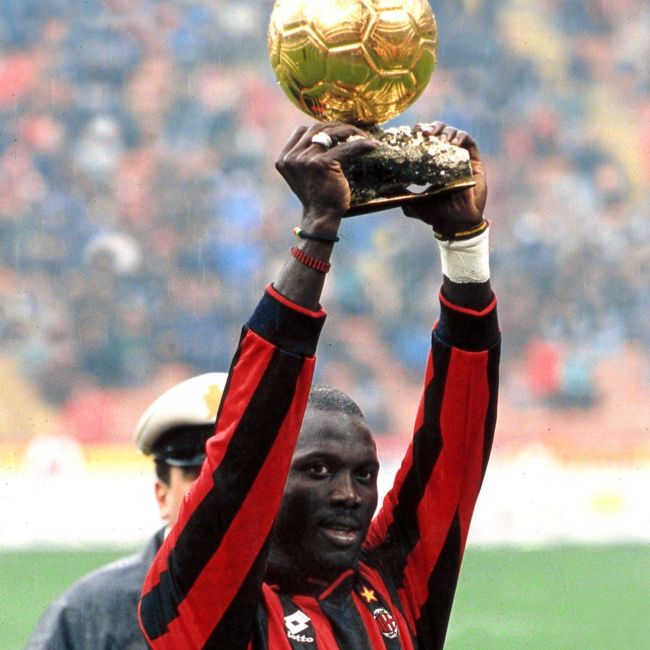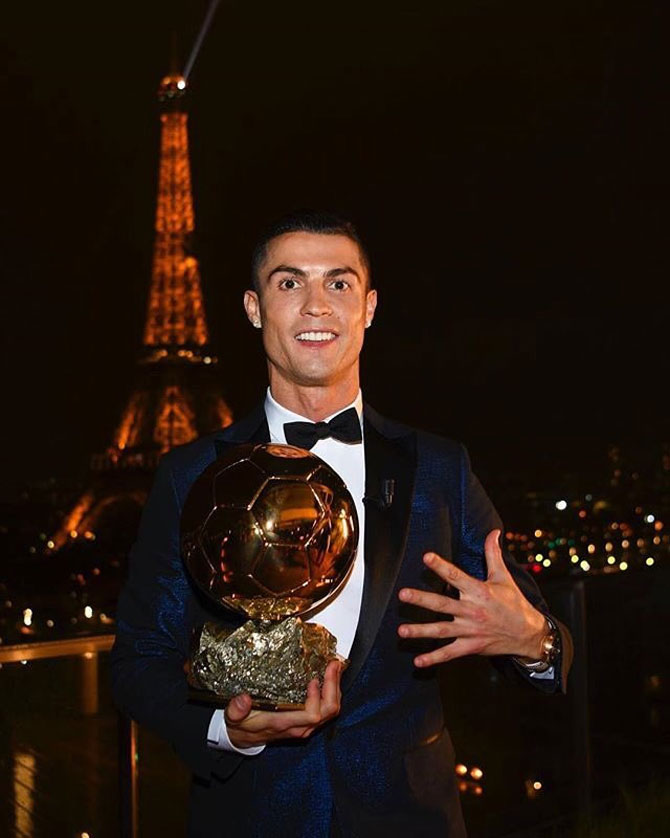In the illustrious world of football, where legends are made and history is written with each pass and goal, there exists an accolade that shines as brightly as the stadium floodlights themselves. The Ballon d’Or, a name synonymous with excellence, is a trophy that holds the dreams and aspirations of footballers around the globe. Established in 1956 by France Football, the Ballon d’Or is more than just an award. It is a symbol of individual brilliance in a team sport that captures the hearts of millions.
In this blog post, we delve into the history, significance, and captivating stories behind the Ballon d’Or, a prize highly coveted by players of this beautiful game called football. The Ballon d’Or is awarded annually to the world’s best footballer. Someone who was a cut above the rest and generally stood out with their performances over the previous year.
What is the Origin and History of the Ballon d’Or?
.jpg?resize=3840%2C2160&ssl=1)
The story of the Ballon d’Or begins in 1956 when the esteemed French sports magazine, France Football, introduced an award that would forever change the landscape of football recognition. The term “Ballon d’Or” translates to “Golden Ball” in English, a name that now resonates with the dreams of players worldwide.
This award is the brainchild of former France footballer and journalist Gabriel Hanot. He is also credited for conceiving the Ligue 1 championship in France and co-founding the European Cup – now known as the UEFA Champions League – with L’Equipe colleague Jacques Ferran.
The Ballon d’Or award was initially considered the European Footballer of the Year award as it was only open to European players at European clubs.
Why the Ballon d’Or?
At its inception, the award aimed to honor the best European footballer, given that the sport was primarily dominated by European nations. The first-ever recipient of this prestigious accolade was Sir Stanley Matthews. The English footballing wizard whose skill and longevity were undoubtedly legendary. Matthews’ recognition set the stage for a tradition that would continue to recognize the brightest stars in football annually.
Expanding Its Horizons
Initially, the Ballon d’Or was reserved for European players who plied their trade in European leagues. However, it underwent a significant transformation in 1995. That year, eligibility was extended to include footballers from all around the world, regardless of the leagues they played in. This change allowed the award to capture a broader spectrum of football talent and truly represent the global nature of the sport. Since 2018, there has also been the women’s Ballon d’or award (called the Ballon d’Or Féminin). Norway’s Ada Hegerberg was the first recipient in 2018.
A Window Into the Sport’s History
Over the years, the Ballon d’Or has documented the evolution of football. It reflects the rise and fall of dominant footballing nations, the emergence of new stars, and the transition from different eras of play. Names like Johan Cruyff, Michel Platini, Zinedine Zidane, Cristiano Ronaldo, and Lionel Messi have graced the award multiple times, leaving indelible marks on the history of the sport. No wonder they are some of the highest-paid footballs in the world, due to their exceptional dedication and skills.
Intriguingly, the award’s history has not been without its controversies and surprises. But these only add to the mystique and anticipation surrounding the award. It’s not just an honor but a symbol of excellence that players aspire to achieve in their careers.
What is the Selection Process for Ballon d’Or?
Democracy in Football
One of the fascinating aspects of the Ballon d’Or is its unique and democratic selection process. Unlike many sports awards that are determined by experts or a single governing body, the winner is chosen through a global vote. This process involves a diverse group of participants who also bring their unique perspectives to the table.
The Voting Panel for the Ballon d’Or
The voting panel includes international journalists, coaches, national team captains, and managers. Each of these groups play a crucial role in determining the winner:
- International Journalists: A significant portion of the votes comes from a panel of international sports journalists. They follow the game closely throughout the year and assess players based on their performances in various competitions, including domestic leagues, continental tournaments, and international matches.
- Coaches and Managers: Coaches and managers from around the world also have a say in the award. Their insights come from firsthand experience, having often faced the nominated players or coached against them.
- National Team Captains: The perspective of national team captains is equally important, as they lead their respective nations in international competitions, providing unique insights into the quality and impact of the nominees on the global stage.
Transparency and Secrecy
The voting process is both transparent and secretive. While the voters’ identities are not hidden, the individual choices and rankings are confidential until the official announcement. This secrecy adds an element of suspense and excitement to the award ceremony.
Weighted Rankings
Each voter submits a list of their top five choices, with a point system assigned to the rankings. The player with the most points at the end of the tally will be the winner. This method has valued consistency and excellence over the years.
An Ever-evolving System of the Ballon d’Or Selection
The selection process has evolved over the years to keep pace with the changing dynamics of football. The inclusion of managers and national team captains, as well as the expansion of eligibility beyond European leagues, reflects the award’s commitment to representing the diverse and global nature of the sport.
Historic change was made to this prestigious individual award in 2002. France Football announced the award will be judged throughout a season instead of the calendar year.
So, last year, Karim Benzema became the first player in the history of the Ballon d’Or to win the award based on his performances throughout the season.
Who are the Notable Past Winners of the Ballon d”Or?
Most legendary figures in football history have graced the Ballon d’Or. These past winners have left indelible marks on the sport, achieving remarkable feats and dazzling fans with their talent. Here are a few of the most iconic names to have won the award:
1. Johan Cruyff The Dutch “Total Football” pioneer won the award three times. His artistry on the pitch and tactical innovations continue to influence the game.
The Dutch “Total Football” pioneer won the award three times. His artistry on the pitch and tactical innovations continue to influence the game.
2. Michel Platini
 The French playmaker won the Ballon d’Or three times in a row during the 1980s. His elegant style and ability to orchestrate the game set him apart.
The French playmaker won the Ballon d’Or three times in a row during the 1980s. His elegant style and ability to orchestrate the game set him apart.
3. George Weah

4. Zinedine Zidane
 The elegant French midfielder won the Ballon d’Or in 1998 after leading France to World Cup glory. His technique and vision made him one of the most graceful players ever to grace the field.
The elegant French midfielder won the Ballon d’Or in 1998 after leading France to World Cup glory. His technique and vision made him one of the most graceful players ever to grace the field.
5. Ronaldo Delima

In 1997, Brazil’s Ronaldo (often regarded as the best number 9 ever) was the first South American winner of the award. He later went on to win again in 2002.
6. Cristiano Ronaldo

Another modern legend, Ronaldo has also collected multiple Ballon d’Or titles. Also, he is the second highest-paid football player in the world in 2023. Additionally, his athleticism, goal-scoring record, longevity, and versatility have made him a dominant force in the sport.
7. Lionel Messi

Often regarded as one of the greatest footballers of all time, Messi has won the Ballon d’Or multiple times, consistently showcasing extraordinary dribbling, goal-scoring ability, and playmaking skills. He’s the player with the highest number of the Ballon d’Or award.
Impact of Ballon d’Or on Players and the Sport
Elevating Careers and Legacies
The Ballon d’Or is more than just an individual award; it’s a life-altering recognition for the players who achieve it. Winning this award has a significant impact on a player’s career and legacy. Here’s how it influences both players and the sport itself:
#1 Career Validation
For players, winning the Ballon d’Or is the ultimate validation of their talent and hard work. It’s a testament to their exceptional skills and performance over a year. Many winners have spoken about how the award serves as a career milestone, affirming their place in football history.
#2 Enhanced Marketability
Beyond the trophy itself, the Ballon d’Or win often results in a boost in a player’s marketability. Commercial endorsements, sponsorships, and global recognition increase, transforming winners into international sporting icons. This not only benefits the players but also contributes to the growth of football as a global brand.
#3 Competitive Drive
The Ballon d’Or fosters healthy competition among footballers. Every year, players aspire to outdo their peers and etch their names in history by winning the award. This competition drives excellence and keeps the sport evolving.
#4 Impact on Transfers
The Ballon d’Or can influence player transfer decisions and market values. Clubs often seek out Ballon d’Or winners to enhance their squads and raise their profiles. Transfers of winners have led to historic and high-profile moves in football.
#5 Global Football Culture
The Ballon d’Or contributes to the rich tapestry of global football culture. It sparks debates and discussions among fans worldwide, thereby creating a sense of excitement and anticipation. It reminds fans of the international nature of the sport and the shared passion that further unites them.
#6 Inspirational Role Models
Ballon d’Or winners become inspirational role models for aspiring footballers, especially in their home countries. Young players look up to them, emulating their playing styles, work ethic, and dedication to the game.
In essence, the Ballon d’Or transcends its role as a mere award; it’s a catalyst for the elevation of careers, the transformation of players into legends, and the continued growth and global appeal of football.
Who will get Ballon d’Or 2023?

The 30 nominees for the 2023 Ballon d’Or award were announced in September 2023. Seven-time winner Lionel Messi is included after he was left off the list in 2022. He is surely one of the favorites to win following his World Cup displays. The ceremony announcing the winners will be held on October 30 at the Theatre du Chatelet in Paris.
Surprises and Controversies around the Ballon d’or
Throughout the award’s history, there have been instances of surprise winners and heated debates about who truly deserved the title. These moments have added an extra layer of intrigue to the award ceremony, making it more than just a recognition but a subject of passionate discussions among fans and experts alike. Players like Thierry Henry, Xavi Hernandez, Andres Iniesta, etc missed out in some years they had outstanding performances which came as a surprise to many football fans and was controversial as it raised issues and concerns for some supporters.
Who are the Favourites for the Men’s Ballon d’Or 2023?
Argentine star, Lionel Messi is the leading favorite ahead of the ceremony which is set to take place on the 30th of October, with Erling Haaland also in contention after a superb debut season with Manchester City.
Messi inspired Argentina to World Cup glory in Qatar scoring seven goals, including two in the final, and won the Golden Ball after a series of mesmerizing displays.
However, Haaland’s extraordinary debut season with Manchester City, when he scored 52 goals in all competitions to fire Pep Guardiola’s side to the Treble, makes him a strong contender.

Spain’s Aitana Bonmati is hotly tipped to win the women’s ballon d’Or award after leading Spain to World Cup glory and also going home with Player of the Tournament award.

Frequently Asked Questions
Who are the Favourites for the Women’s Ballon d’Or 2023?
Who was the First Ballon d’Or Winner?
Stanley Matthews won the first-ever Ballon d’Or award in 1956. Known for his exquisite close control, great dribbling ability, and intelligence on the field, Matthews inspired a famous come-from-behind 4-3 victory for Blackpool in the 1953 FA Cup final against Bolton Wanderers. The fixture later came to be known as the ‘Matthews final’.
He also finished as a runner-up in the English top flight with Blackpool in the 1955-56 season en route to becoming the first Ballon d’Or winner.
How do you get the Ballon d’Or award?
Each journalist makes their top five picks from the 30-man shortlist, with each ranking earning a different points value/number of votes. Afterward, the player who gathers the most points in voting is declared the winner of the year.
Other Related Articles
- Who is Sir Bobby Charlton? | A Biography of Triumph and Success
- Top 15 Highest-Paid Footballers In The World (2023)






























![Top 10 Most Expensive Drinks in the World [2024]](https://i0.wp.com/lifestylemetro.com/wp-content/uploads/2024/05/most-expensive-drinks-in-the-world-1.webp?resize=360%2C180&ssl=1)





![How to Deal with Grief [10 Practical ways] | Knowing its Stages](https://i0.wp.com/lifestylemetro.com/wp-content/uploads/2024/06/how-to-deal-with-grief-1.webp?resize=360%2C180&ssl=1)




























